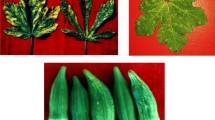Abstract
A virus isolated from diseased tobacco plants growing in Macedonia, northern Greece, had host range and physico-chemical properties typical of a tobravirus. Although it was serologically unrelated to any of the ten tobravirus isolates tested, it reacted in spot hybridization tests with a probe derived from RNA-1 of tobacco rattle virus (TRV) strain SYM. Therefore, the isolate probably represents a previously undescribed serotype of TRV. Male, female and juvenileTrichodorus similis nematodes recovered from the rhizosphere of the diseased tobacco plants transmitted TRV in each of three laboratory experiments. In two of these experiments 50% and 54%, respectively, of the nematodes transmitted virus toPetunia hybrida bait plants, whereas only 18% transmitted virus toNicotiana tabacum plants in a third test. Ultrathin sections of the feeding apparatus of individual nematodes, which had transmitted virus, were examined by electron microscopy. Virus particles were observed, retained as a monolayer in the apices of the oesophageal lumen and as a group of particles within a matrix in the open part of the lumen.
Similar content being viewed by others
References
Alphey TJW and Taylor CE (1986) European Atlas of the Longidoridae and Trichodoridae. Scottish Crop Research Institute, Dundee, Scotland. 123 pp
Boccara M, Hamilton WDO and Baulcombe DC (1986) The organization and interviral homologies of genes at the 3′ end of tobacco rattle virus. EMBO Journal 5: 223–229
Brown DJF (1989) Viruses transmitted by nematodes. EPPO/OEPP Bulletin 19: 453–461
Brown DJF and Boag B (1988) An examination of methods used to extract virus-vector nematodes (Nematoda: Longidoridae and Trichodoridae) from soil samples. Nematologia Mediterranea 16: 93–99
Brown DJF, Ploeg At and Robinson DJ (1989) A review of reported associations betweenTrichodorus andParatrichodorus species (Nematoda: Trichodoridae) and tobraviruses with a description of laboratory methods for examining virus transmission by trichodorids. Revue de Nematologie 12: 235–241
Choleva BM (1988) Nematodes of the family Trichodoridae in Bulgaria. Nematologica 34: 261–262
Cremer MC and Kooistra G (1964) Investigation on notched leaf (‘Kartelblad’) ofGladiolus and its relation to rattle virus. Nematologica 10: 69–70
Cremer MC and Schenk PK (1967) Notched leaf inGladiolus spp. caused by viruses of the tobacco rattle virus group. Netherlands Journal of Plant Pathology 73: 33–48
Koliopanos CN and Kalyviotis-Gazelas C (1973) Plant-parasitic nematodes and their hosts identified for the first time in Greece. Annales Institute Phytopathologie, Benaki 10: 301–306
Mayo M, Robertson WM, Legorburu FJ and Brierley KM (1995) Molecular approaches to an understanding of the transmission of plant viruses by nematodes. In: Lamberti F, De Georgi C and Mck Bird D (eds) Advances in Molecular Plant Nematology (pp. 277–293) Plenum Press, New York
Pelsmaeker M de (1987) Het belang en de controle van virusvectornematoden en grondvirussen in de aardappel-, de hopen de aardbeienteelt. Mededelingen Centrum voor Studie van de virus-transmissie door nematoden, IWONL Gent, Belgium. 93 pp
Pelsmaeker M de and Coomans AV (1987) Nematodes in potato fields and the relation to some biotic and abiotic factors. Mededelingen van de Faculteit voor Landbouwwetenschappen Rijksuniversiteit Gent 52: 561–569
Ploeg At, Asjes CJ and Brown DJF (1991) Tobacco rattle virus serotypes and associated nematode vector species of Trichodoridae in the bulb-growing areas in the Netherlands. Netherlands Journal of Plant Pathology 97: 311–319
Ploeg At, Brown DJF and Robinson DJ (1992) The association between species ofTrichodorus andParatrichodorus vector nematodes and serotypes of tobacco rattle tobravirus. Annals of Applied Biology 121:619–630
Robertson WM and Henry CE (1986) An association of carbohydrates with particles of arabis mosaic retained withinXiphinema diversicaudatum. Annals of Applied Biology 109: 299–305
Robinson DJ (1989) Tobacco rattle tobravirus: variation among strains and detection by cDNA probes. EPPO/OEPP Bulletin 19: 619–623
Robinson DJ (1995) Genus Tobravirus. In: Murphy FA, Fauquet C, Bishop DHL, Ghabrial SA, Jarvis AW, Martelli GP, Mayo MA and Summers MD (eds) Virus Taxonomy — The Classification and Nomenclature of Viruses: 6th Report of the International Committee on Taxonomy of Viruses (pp. 438–440) Springer Verlay, Vienna
Robinson DJ and Harrison BD (1985a) Unequal variation in the two genome parts of tobraviruses and evidence for the existence of three separate viruses. Journal of General Virology 66: 171–176
Robinson DJ and Harrison BD (1985b) Evidence that broad bean yellow brand virus is a new serotype of pea early-browning virus. Journal of General Virology 66: 2003–2009
Robinson DJ and Romero J (1991) Sensitivity and specificity of nucleic acid probes for potato leafroll luteovirus detection. Journal of Virological Methods 34: 209–219
Roca F and Lamberti F (1984) Trichodorids (Nematoda) from Italy. Nematologia Mediterranea 12: 95–118
Roca F and Lamberti F (1985) Distribution of Longidoridae, Xiphinemidae and Trichodoridae. In: Alphey TJW (ed) Atlas of Plant Parasitic Nematodes of Italy (p. 44) Scottish Crop Research Institute, Dundee, Scotland
Seinhorst JW (1963) A redescription of the male ofTrichodorus primitivus (De Man), and the description of a new speciesT.similis. Nematologica 9: 125–130
Semancik JS (1966) Purification and properties of two isolates of tobacco rattle virus from pepper in California. Phytopathology 56: 1190–1193
Taylor CE, Brown DJF, Neilson R and Jones AT (1994) The persistence and spread ofXiphinema diversicaudatum in cultivated and uncultivated biotopes. Annals of Applied Biology 124: 469–477
Taylor CE and Robertson WM (1970) Location of tobacco rattle virus in the nematode vector,Trichodorus pachydermus Seinhorst. Journal of General Virology 6: 179–182
Van Hoof HA, Maat DZ and Seinhorst JW (1967) Quelques donnee sur la presence du rattle virus du tabac et de ses vecteurs en France. Medelelingen va de Faculteit voor Landbouwwetenschappen Rijksuniversiteit Gent 32: 939–947
Author information
Authors and Affiliations
Rights and permissions
About this article
Cite this article
Brown, D.J.F., Robertson, W.M., Neilson, R. et al. Characterization and vector relation of a serologically distinct isolate of tobacco rattle tobravirus (TRV) transmitted byTrichodorus similis in northern Greece. Eur J Plant Pathol 102, 61–68 (1996). https://doi.org/10.1007/BF01877116
Accepted:
Issue Date:
DOI: https://doi.org/10.1007/BF01877116




